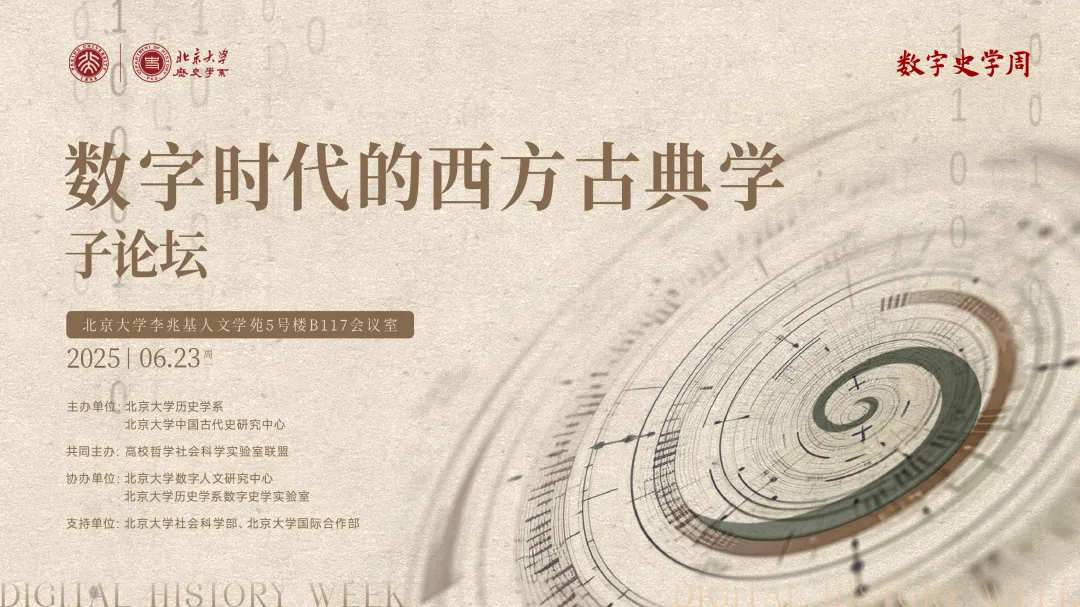【学界资讯】数字史学周:数字时代的西方古典学子论坛
https://mp.weixin.qq.com/s/TO93-NnjmgvjVWTANJapwQ
数字史学周:数字时代的西方古典学子论坛


上午场线上讲座
09:00-10:30 am
Large-scale Urban Models as Tools for Scientific Discovery: The Case of Rome Reborn
BERNARD FRISCHER
Professor Emeritus
Luddy School of Computing and Engineering, Indiana University
Founder of Flyover Zone, Inc.
Abstract
This lecture presents the Rome Reborn project, a digital reconstruction of ancient Rome at its peak in 320 CE. Initiated in 1996 and now in its fourth version, Rome Reborn enables users to explore the city in immersive 3D, offering scholars and students unprecedented access to its urban form. The lecture explains the project's origins, methodology, and goals, especially its role as an epistemic tool—what I call a“simpirical” instrument—for generating new historical insights through simulation and observation.
To illustrate this, I present four case studies that show how Rome Reborn supports original research: from re-evaluating the solar alignments of Augustan monuments like the Ara Pacis and Montecitorio Obelisk; to identifying the likely deity of the Pantheon through archaeoastronomy; to uncovering why the Emperor Constantius II began his Forum tour on the Rostra; and finally, to proposing a new understanding of land use and spatial organization in Rome based on organic rather than geometric principles. Each case shows how digital visualization can open new empirical pathways in the study of ancient urbanism.
#ZOOM Meeting ID: 269 877 0826
Passcode: 757210
https://zoom.us/j/97887412833?pwd=PTaZn9mbQjHpXhOqk9GJmPGqTcqXnz.1
下午场
历史学系李兆基人文学苑5号楼B117 (地下一层)
#ZOOM Meeting ID: 269 877 0826
Passcode: 757210
https://zoom.us/j/97887412833?pwd=PTaZn9mbQjHpXhOqk9GJmPGqTcqXnz.1
13:00-13:30
Pompeii Reborn: House of the Tragic Poet.'
Virtual Tourism as a Channel of Scholarly Communication
BERNARD FRISCHER
Professor Emeritus
Luddy School of Computing and Engineering, Indiana University
Founder of Flyover Zone, Inc.
Abstract
This brief presentation discusses the collaboration between Roman archaeologists and the technical team at the educational publisher Flyover Zone to create a virtual tour of the House of the Tragic Poet in Pompeii. The house, buried in the eruption of Mt. Vesuvius in 79 CE and excavated in the 1820s, is one of the most famous domestic structures in the city—known especially for its rich wall paintings and mosaic floors.
Guided by current archaeological research, the team at Flyover Zone digitally reconstructed not only the architecture but also the interior decoration and furnishings of the house. Where the evidence is incomplete, the project follows the guidelines of the Seville Charter on Virtual Archaeology (ratified by ICOMOS in 2018), which require all uncertainties or hypothetical elements in a reconstruction to be clearly disclosed to the viewer. In this way, the virtual tour balances immersive experience with scholarly transparency.
13:30-13:45
Working in the Digital Humanities Industry: What is it like? The US Experience.
JEREMIAH STEVENS
Chief Technological Officer
Flyover Zone, Inc.
13:45-15:00
庞贝“悲剧诗人之家”虚拟实境体验
15:00-15:45
Digital Encoding of Fragmentary Literature: A Case Study on the Theban Epic Cycle and Antimachus’ Thebaid in the Thebarum Fabula Project
MANOLIS SPANAKIS
Lecturer of Greek Language and Culture
Beijing Foreign Studies University
评议人:李林芳 北京大学中文系助理教授
Abstract
Developed by the research team Oedipodioniae Thebae (FFI2015-68599-R) under the direction of Prof. Cecilia Criado (University of Santiago de Compostela), the Thebarum Fabula project (http://thebarumfabula.usc.es/en/) represents a significant advancement in digital philology, moving beyond mere text digitization to offer dynamic, critically enriched editions of ancient Greek and Latin texts related to the Theban myth.
This study examines the project's innovative approach to the reception of the Theban myth from the Archaic period to Late Antiquity, with particular attention to the digitization of critical editions. My contribution involves the XML-based encoding of two key fragmentary works: (1) M.L. West's 2003 Loeb edition of the Theban Epic Cycle fragments and (2) V.J. Matthews' 1996 Brill edition of Antimachus of Colophon's Thebaid. The digital editions incorporate the original Greek text, critical apparatus, English and Modern Greek translations, and scholarly commentary, ensuring both philological rigor and enhanced accessibility.
By analyzing these encoded editions, this research demonstrates how Thebarum Fabula bridges traditional philology and digital innovation, offering scholars an interactive platform for studying Theban mythography. The project not only preserves scripta manent in a modern framework but also redefines classical scholarship through its integration of textual criticism, multilingual translation, and digital visualization tools. Ultimately, Thebarum Fabula sets a new standard for open-access classical research, meeting the demands of 21st-century academia while maintaining the highest standards of philological precision.
15:45-16:00
茶歇
16:00-18:00
数字人文与古文字研究
石晨叶
里尔大学古代世界历史、考古与文学研究室研究员
Abstract
本次讲座将围绕数字人文领域的最新进展,特别聚焦其在古文字研究中的创新应用与实践。讲座首先阐释数字化方法如何变革传统古文字学研究,包括AI技术在字形分析、书写特征的计算机识别,以及跨语言文本处理方面的新方法与技术路径。随后,通过具体实例展示这一方法的实际操作:对古希腊纸草文书进行多层次的图像分析、字形特征的自动提取,以及AI辅助的模式识别;演示数字化文献库自动处理的实现方式;介绍机器辅助翻译和整理系统的功能与优势。最后部分将探讨这些技术在教研领域的具体应用,涵盖古文字教学的数字化实践、跨文化书写系统的比较研究,以及文献研究中创新方法的开拓与实践路径,以期为从事相关研究和教学的学者提供新视角与新工具。